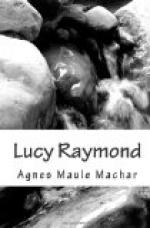Mr. Raymond had often longed for the time when his earthly work should be done, and he should be called to the presence of his Saviour—to reunion with his early-lost wife. And now, though in the unconsciousness of his exhausted powers he knew it not, that time had come. His “falling asleep” was as peaceful as the sinking of a child into its nightly slumber; and Lucy did not realize that it was death, till, in the dark December morning, she stood by the cold white couch on which lay the inanimate form to which, from her earliest days, she had always looked as her protector and guide. It was hard to persuade herself that that cold form was not her father, but that all that had made the living, sentient being had passed to another state of existence beyond her power to follow—beyond her power to conceive. In the strange awe that came upon her, she lost for a time the sense of the desolation of her bereavement—lost all thought for herself, in trying to pierce the darkness which hung between her and the “undiscovered lands” in which both her parents now were. With Fred it was much the same,—an awestruck solemnity at first repressing in both the natural feeling of personal loss. Harry was the only one whose bitter, childish grief broke forth uncontrolled.
But there was time in the blank, desolate days that followed to realize the full bitterness of the bereavement. Once out of the still, solemn chamber, which seemed to hush all violent emotion, there were associations at every step, in every room, of him whose place should know him no more, to call forth the uncontrollable agony of tears that had for a time been repressed. And when the still form had been carried to its last resting-place, and the heavy consciousness made itself felt that he was gone, never in any possible event to return to them, it seemed to Lucy as if it would have been too terrible to bear but for the Saviour, to whom she carried her grief, and found that, though He does not always at our asking restore our sick to this mortal life, yet that, when He takes them away, He can and will be a very present “help in time of trouble.”
But there was already another grief looming darkly in the distance, which Lucy almost shrank from facing. The home that had been hers from her birth must be broken up. The external surroundings in which her life had been always set were to be torn from it; and any other phase of life seemed as if it must be a dreary blank. She could not then realize the possibility of ever forming new associations, or taking root in any other home. And indeed it is doubtful whether one ever does take root again in the same sense as in the home of childhood, which is linked with the earliest associations of opening thought, and with all the hallowed ties that cluster around a child’s happy home. Other houses are but places of abode, made home by association: that seemed absolutely and in itself home.




